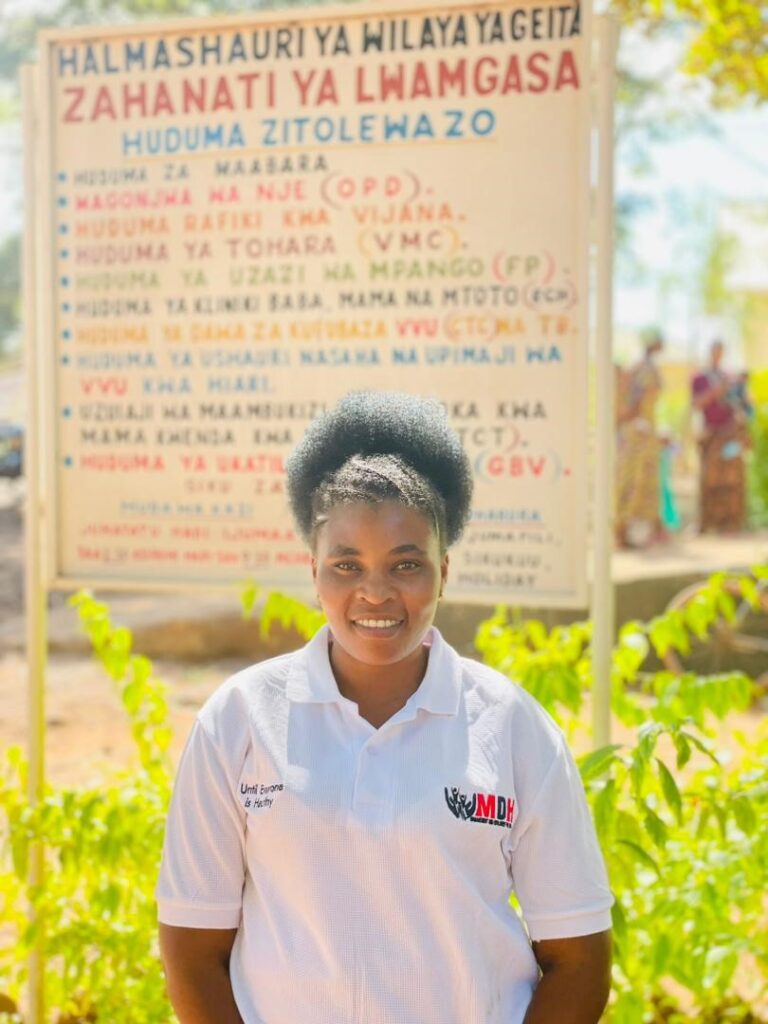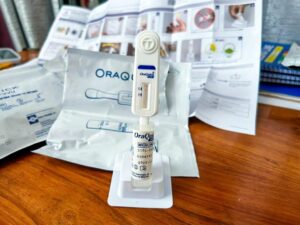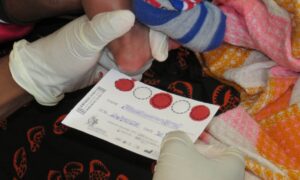By Henry Daniel and Kuduishe Kisowile
Geita. Community based health services in Tanzania can be traced back to 1967 during the Arusha declaration; and expedited by the Alma Atta declaration of 1978 which identified primary health care as the key to the attainment of the goal of Health for All.
In 2014, Tanzania approved the National Community-Based Health Program (CBHP) Policy Guidelines, paving the way to establish a national public sector cadre of paid Community Health Workers (CHWs). Since then, thousands of CHWs have been trained by the Government of Tanzania and implementing agencies such as the U.S Centers for Disease Control and Prevention (U.S CDC) through partners including Management and Development for Health (MDH).
Chausiku Mtogwa, is a 30-years-old CHW trained by MDH and serving the community of Lwamgasa-Geita since October 2021. She was motivated to take the roles of community-based health services after seeing many people losing their lives in her community due to inadequate health services and health education.
“It hurts seeing many villagers of Lwamgasa dying of preventable and manageable diseases, due to lacking accessibility to health services and believing in witchcraft. So, I decided that I can help them by educating and linking them to healthcare centers”, said Chausiku.
She is among 329 CHWs trained by the Afya Jumuishi Project in Geita region, to support HIV and TB screening and treatment in the communities. Especially for clients living in remote areas far from healthcare facilities. They receive services through the community ART approach of the Afya Jumuishi project.
Afya Jumuishi project aim to contribute towards accelerating progress on the PEPFAR and National goal of attaining UNAIDS 95-95-95 targets and controlling AIDS epidemic in Tanzania by 2030 through provision of comprehensive facility and community HIV prevention, care and treatment services for all persons at risk, living with and affected by HIV with strategic focus among key and vulnerable population. The project is funded by PEPFAR through U.S CDC and implemented by MDH in Tabora and Geita regions.
CHWs play a crucial role in the Afya Jumuishi project as they provide targeted HIV Testing Services (HTS) to identify undiagnosed Persons living with HIV and link them to care and treatment services. Through Afya Jumuishi Project, from October 2021 to September 2022 In Geita region, 3,037 new people living with HIV (PLHIV) were diagnosed among 10,801 clients tested for HIV from the community. This makes 25 percent of all new PWHIV diagnosed during that period in the community and facility level.
In Tabora region, 4,386 PLHIV were diagnosed out of 31,057 clients tested for HIV from the community between October 2021 to September 2022. This makes 21 percent of all new PWHIV diagnosed during that period in the community and facility level. This shows the significance of the work done by CHWs in the community In HTS services as It contributes to about a quarter of newly diagnosed PWHIV.

Figure 1: Chausiku Mtogwa, a community health worker (CHW) at Lwamgasa, Geita.
Photo by Henry Daniel, Geita.
A typical day for Chausiku begins at Lwamgasa dispensary, where she prepares her screening tools and hotspot mapping tools ready to face a new day. She then visits the local authorities to obtain schedules and permits to provide health education and screening.
After that, she visits hotspots for KVP including bars, guest houses and local beer shops where she provides education and screening for HIV testing and prevention services to those who consent. Once she obtains those eligible for those services, she consults a community tester for provision of those services and links them.
As a result of Key and Vulnerable Populations (KVP) friendly services, Pre-Exposure Prophylaxis(PrEP) and HIV self testing training provided by MDH; Chausiku has been able to educate and screen 536 female sex workers (FSWs) since September 2022. Out of those, 179 were linked and tested for HIV; 47 were HIV positive and began treatment. She has also been able to link 243 FSWs to PrEP services.
One of her success stories is that of Christina Mihayo whom she met during her routine health education and HIV screening visits. It was a chance encounter that ultimately saved Christina’s life. Christina was weak, had severe cough, chest pain, and a fever that lasted for months. She had several visits to the witchdoctor to seek help as advised by her mother, but her condition worsened.
After a long discussion on HIV and TB; Chausiku offered Christina HIV testing services and found her to be HIV positive. She provided her with a container for collection of sputum sample for TB investigation, which was then taken to the nearby Lwamgasa health center. After three days, she received a call from a healthcare provider informing her that Christina is TB positive.
Christina received TB treatment for two weeks and later on continued with both TB treatment and ART regimen. Currently she is doing well,
“I almost died”, said Christina reminiscing about her ailment. Christina is one among many whose lives were saved and have benefited from the Afya Jumuishi Project.

Figure 2: Chausiku Mtogwa (left) and Patrick Kassa, registered nurse (right) during their follow up visit to Christina Mihayo (middle) at Mlima wa 11 areas, Geita district council in the Geita region.
Photo by Henry Daniel, Geita.
With funding from PEPFAR through CDC, MDH is working on the Afya Jumuishi Project by optimizing CHWs to make progress to end the death related to HIV and TB disease by 2030. CHWs play a vital role in service delivery of primary health care considering the epidemiological burden and health personnel shortage.
During her income and expenditure budget plan speech for the fiscal year 2023/24, the Minister of Health Hon. Ummy Mwalimu said that the first priority for the budget will be to strengthen the services of prevention against diseases; including strengthening health services at the community level.
In doing so, the Ministry of Health has allocated 13.5 Billion shillings for the six months long special training of about 5,000 CHWs who will then be employed and provided with tools for their work; as a bid to improve prevention services.
To support the efforts of the Government of Tanzania, MDH trains CHWs, provides them with allowance and tools for their work. Through Afya Kwanza project, MDH supports 271 CHWs in Dar es Salaam and 652 CHWs in Kagera. Also, through the Afya Jumuishi project, MDH supports 329 CHWs in Geita and 737 CHWs in Tabora. Moreover, MDH also supports 1,512 CHWs through the Global Fund TB project which covers 56 districts in 7 regions including Kagera, Mara, Mbeya, Ruvuma, Shinyanga, Simiyu and Tanga; each district has 27 CHWs. These facilitating strategies strengthening primary health care and health systems through optimization of CHWs is significant to even the field among populations and close the gap in provision and delivery of HIV/TB services.
Edited by Kuduishe Kisowile.



